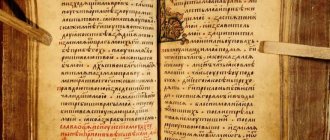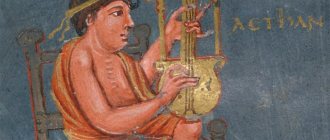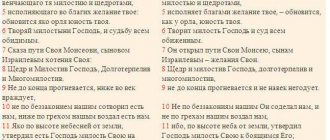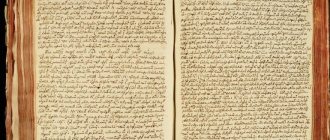Text of Psalm 49
The most popular versions of prayer are Church Slavonic and Russian, a modern translation. Christians hear the first text in churches during services; it is also not forbidden to use it for private appeals to the One Creator. The second is a worthy alternative with which unprepared righteous people can better understand the meaning of the ancient work.
With accents in Church Slavonic
In Russian
Same Psalm
Look upon us, O all-merciful Lady, and have mercy on us who love Your holy name; With all our hearts we cry out and pray to You, Lady, direct our feet on the path of salvation and may all lawlessness not rule our will. Hear, heavens, and teach, to earth: just as a baby cannot live without a nurse, so without our Lady, the Ever-Virgin Mary, we cannot receive eternal salvation. There is peace for many who love, honor and worship the Queen of Heaven, for under Her protection those who remain will be far from eternal destruction.
The princes of hell, having bypassed us, have been everywhere, the nets of malice in heaven are everywhere to ensnare our hearts and souls, but from invoking Your holy name, O beloved Mother of God, the machinations of the enemies disappear like smoke. The world is full of those who love Your name and there is no temptation for them; our soul will live and praise You, its most merciful Lady; Your mercies will always help us; We sing the praises of the Lord to You seven days a week and will not leave calling on You, our helper, in all the days of our life, for through this we will not get lost, like a lost sheep, because Your ways are heavenly light and truth.
Song instead of glory
Rejoice, blessed Ever-Virgin Mary; who can adequately thank and praise you? The heavens are filled with Thy glory and the earth is filled with Thy mercy; by Thy seedless Nativity, Thou hast freed our souls from the ashes of eternal death and placed them in the paradise of immortality.
According to the 17th kathisma troparia, ch. 1
The multitude of Christians rejoice in Thy name, O Mother of God, who call upon Thy heights every day and magnify Thy heights with love. You are the praise and helper and unashamed intercessor of all who honor Thee with faith.
Rejoice at the earthly Mother of the Lord, praise the heavenly Powers, glorify those who reign on earth, come, all of you, rejoice with the words of the Mother of God in accordance with your faith, rejoicing
The new heaven, containing the inexpressibly existing in the heavens, the incontainable Word, the animated chamber of the Lord of creation, the glorious and most famous city of our Savior: make me a citizen of the heavenly fatherland
Prayer
Most Holy Lady, Lady Theotokos! We resort to You, Pure One: For You are an insurmountable wall, intercession and protection for all who come running to You with faith and hope! We pray to Thee, Most Blessed One, hear the prayer of Thy unworthy servants and ever stand for Thy servants who have fallen asleep. You will intercede for those who Orthodoxy revere Thee, who resort to Thy protection and the warmth of those who pray to Thee in illness, sorrow and adversity; but Your intercession, Your intercession is most beneficial to us after our death; You show Your immediate help to Your servant and do not cease to show Your mercy to all who pray to You and pour out the great and rich mercies of Your Son and our God on all believers: in You, the only one in God, imams have firm hope and trust: no one, praying to You, departs from You are without help, joy, consolation, and pleasure. We pray to You, O Most Holy Theotokos, Lady of the world, who have unreliable hopes, be today an intercessor to Him who was born of You for Your departed servants, beg Your Son and our God to grant them forgiveness and remission of sins. Pray, Mother of God, much more can a motherly prayer do for the mercy of the Lord; For from You the Lord accepts every word of petition; therefore You also accept our prayers and supplications offered to You, Most Holy Virgin, from all our hearts and all our souls for the souls of Your departed servants. We pray to You, help them. Mistress, by your motherhood to the Lord, boldly reach a quiet refuge in heavenly Jerusalem; help them, O zealous Intercessor, to appear shamelessly at the terrible and second coming of Your Son, where each one will either be glorified or ashamed by his deeds; help them, O Most Gracious One, to be justified before the face of Him who sits on the throne of glory, so that they will not be ashamed before the Angels and all the Saints, before the whole world, above and below. Oh, All-Singing Mother, Lady Theotokos, we pray to You, intercede, save, preserve and eradicate the future torments of Your departed servants, may they not perish forever, but may they be saved by Your prayers and pass from death to the belly. We, sinners and unworthy servants of Yours, will not retreat from You, we will not stop crying out to You in tenderness: Most Holy Lady, Queen and Lady! pray to Thy Son and our God for Thy departed servants, that the Lord may grant them remission of sins; send them, O Blessed One, to reach the longed-for fatherland and see the blessings of heaven, which no eye has seen, no ear has heard, and no one has sighed in the heart; pray for them, Mother of God, that through Your intercession they may be worthy to partake of these blessings in the Kingdom of Your Son, Christ our God. For You are the only blessed and powerful Intercessor among women, hope, protection and refuge for all who flow to You - You are the bridge , lead those who are from earth to heaven and the opening of the doors of heaven. Amen.
We advise you to study the Icon of the Savior in Power
The Story of Psalm 49
The 49th Psalm should be considered as a collection of moralizing verses written by Asaph during the reign of the prophet David. In this work, the author raises such important topics: people’s worship of the Lord, fulfillment of the commandments. At the request of the king, the service was held in a solemn, dazzling atmosphere. Thus, the ruler emphasized that performing rituals was extremely important.
Asaph does not agree with this; his goal is to dispel the false view. David himself scattered them on his own; this happened during the transfer of the Ark of the Covenant to Mount Zion, then the prophet demanded moral purity from the people. The content of Psalm 49 can be compared to the content of the songs written by the king. This led experts to believe that Asaph was a contemporary of the famous psalmist.
When is Psalm 49 read?
The warning prayer was relevant for the ancient Jews, and it is so now, in the eyes of Orthodox Christians. Often visiting church and taking part in the sacraments, a person does not necessarily have the main thing in his soul - true, sincere faith. The author of Psalm 49 encourages people to focus on inner achievement. In other words, he asks the righteous to think about their lives, to take responsibility for their thoughts, words, and actions.
The song is read privately in the following cases:
- when it is necessary to guide unbelievers on the path;
- to bring reason to loved ones without the risk of conflict.
You can say the prayer in Russian and Church Slavonic; this has no fundamental significance.
Psalm 134
The collection of Psalms has several parts. The small hallel part ends with the prayer Psalm 134. These are religious hymns that end with the word “hallelujah.” The text of Psalm 134 is the connecting part of prayers 133 and 135. Songs of praise are aimed at praising the Lord, to be grateful to him from day to day.
Text of prayer Psalm 134
The song is sung in churches in Church Slavonic, but you can read Psalm 134 in Russian.
In Church Slavonic with accents
1 Praise the name of the Lord, praise, servants of the Lord,
2 Standing in the temple of the Lord, in the courtyard of the house of our God.
3 Praise the Lord, for the Lord is good, sing praise to His name, for it is good:
4 Because the Lord has chosen Jacob for His own possession, Israel.
5 For I have known that the Great Lord is, and our Lord is above all gods.
6 Whatever the Lord pleases, create in the heavens and on the earth, in the seas and in all the deeps.
7 Bringing up clouds from the last of the earth, making lightning into rain, bringing up winds from your treasures.
8 And smite the firstborn of Egypt, from man to beast.
9 I sent signs and wonders in the midst of you, Egypt, against Pharaoh and against all his servants.
10 And smite the tongues of many, and slay the mighty kings:
11 Zion king of the Amorites, and Og king of Bashan, and all the kingdom of Canaan,
12 And I will give the land their inheritance, an inheritance to Israel for His people.
13 Lord, Your name endures forever, and Your memory endures forever:
14 For the Lord will judge his people, and will pray for his servants.
15 Idols are a tongue, silver and gold, the work of human hands.
16 They have lips and do not restrain; they have eyes and do not see,
17 They have ears and will not hear, for there is spirit in their mouth.
18 Let those who do things, and all those who trust in her, be like them.
19 To the house of Israel, bless the Lord; to the house of Aaron, bless the Lord; to the house of Levi, bless the Lord.
20 You who fear the Lord, bless the Lord.
21 Blessed is the Lord from Zion, who lives in Jerusalem.
In Russian
1 Praise the name of the Lord, praise ye servants of the Lord,
2 standing in the house of the Lord, in the courts of the house of our God.
3 Praise the Lord, for the Lord is good; sing to His name, for it is sweet,
4 For the Lord has chosen Jacob for himself, Israel for his own.
5 I knew that the Lord is great, and our Lord is above all gods.
We advise you to study Happy Easter
6 The Lord does whatever he wants, in heaven and on earth, on the seas and in all the deeps;
7 He raises up the clouds from the ends of the earth, He makes lightning in the rain, He brings out the wind from His storehouses.
8 He smote the firstborn of Egypt, from man to beast,
9 He sent signs and wonders among you, O Egypt, against Pharaoh and against all his servants,
10 He smote many nations and destroyed mighty kings:
11 Sihon king of the Amorites, and Og king of Bashan, and all the kingdoms of Canaan;
12 And he gave their land for an inheritance, for an inheritance to Israel his people.
3 Lord! Your name endures forever; God! memory of You to generation and generation.
14 For the Lord will judge His people and have mercy on His servants.
15 The idols of the heathen are silver and gold, the work of human hands:
16 They have a mouth, but they do not speak; They have eyes, but they do not see; Yours.
17 They have ears, but they hear not, and there is no breath in their mouth.
18 Those who make them and everyone who trusts in them will be like them.
19 House of Israel! bless the Lord. House of Aaron! bless the Lord.
20 House of Levi! bless the Lord. Those who fear the Lord! bless the Lord.
21 Blessed is the Lord from Zion, who dwells in Jerusalem! Hallelujah!
History of writing
The song of praise is believed to have been written during the restoration of the Second Temple of Jerusalem
This is an important event for the entire Jewish people
- Verses 1-4: Praise the Lord at every opportunity. The author encourages everyone to sing psalmody. The people of Israel are called to praise the Almighty.
- Verses 5-8: The Lord is great on sea and on land. God's power is great, it can mix fire and water. If there is no faith or it is weak, then the Lord may not hear prayers and may not respond to suffering. He is above all Jews.
- Verses 9-12: The story of the creation of Israel sounds, all its ups and downs, wars and joys.
- Verses 13-14: Prophecies are spoken that tell of the power of the Most High.
- Verses 15-18: The author describes the uselessness of other gods. After all, they are created in human likeness.
- Verses 19-21: The singer once again calls on the people of Israel and the rest of the people to praise the works of the Lord.
Interpretation
Many experts insist that Psalm 49 be called an edification, but not a prayer or a song of praise. Thus, his text glorifies the name of the Lord, but the emphasis is on the need for the righteous to warn one another. The author addresses the lines to those who treat religion as a ritual service.
He condemns sacrifice, which is accompanied by sincere repentance. Those who call themselves children of the Church, but in life do not hesitate to be hypocrites and not adhere to God’s commandments, are also subject to reproof. This path for Christians, according to the psalmist, is disastrous.
Asaph describes the Last Judgment, during which God the Lord strictly examines the actions of the chosen people. He will accuse the Jews of serving Him “formally”, because along with making sacrifices from humble hearts, they treated their neighbors hypocritically.
The meaning of the work is revealed to those who take the time to carefully analyze the interpretation of the verses of Psalm 49:
- Verse 1 and 2: The Most High, who rules the world, is magnified.
- Verses 3 to 6: describes the fate of Christians who call themselves righteous, but are not. The author emphasizes that they will receive a fair trial.
- Verse 7 to 13: considerations on the topic of God's attitude towards the Jews. He condemns them for the formal nature of their service and their perfect rituals of sacrifice. According to the author, the Lord does not need the latter, because all living things, including livestock and animals in the forest, already belong to Him. This ritual was originally established for people who trust in Him.
- Verse 14 and 15: The Most High needs mankind's sincere faith in Him. The main sacrifice of people should be the sacrifice of reverence, that is, Christians need to live according to the commandments and praise God.
- Verse 16 to 23: the Jews sinned with immorality and hypocrisy, which is what the author accuses them of. The Lord knows about the true thoughts of His servants, so there is no point in hoping that a person’s sins will remain invisible to the eye of the Most High. Salvation will be granted to those who do not stop at praising the Lord, who strive for a pious life.
True Worship of the Lord
Christian theologians also see in these lines an indication of the abolition of sacrifices as such.
When Christ comes, believers will no longer offer animal burnt offerings on the altar. The Lord established the Old Testament order for a different purpose - it was a prototype of the great sacrifice of the Savior on the cross. This was the only way to atone for human sins. The interpretation helped to understand why Christians read Psalm 49 - by chanting these lines, they warn their brothers and sisters in faith. The lesson that the Holy Spirit imparts in these lines is this: do not become overly involved in rituals at the expense of true godliness. And it lies in love for the Lord and neighbor.




